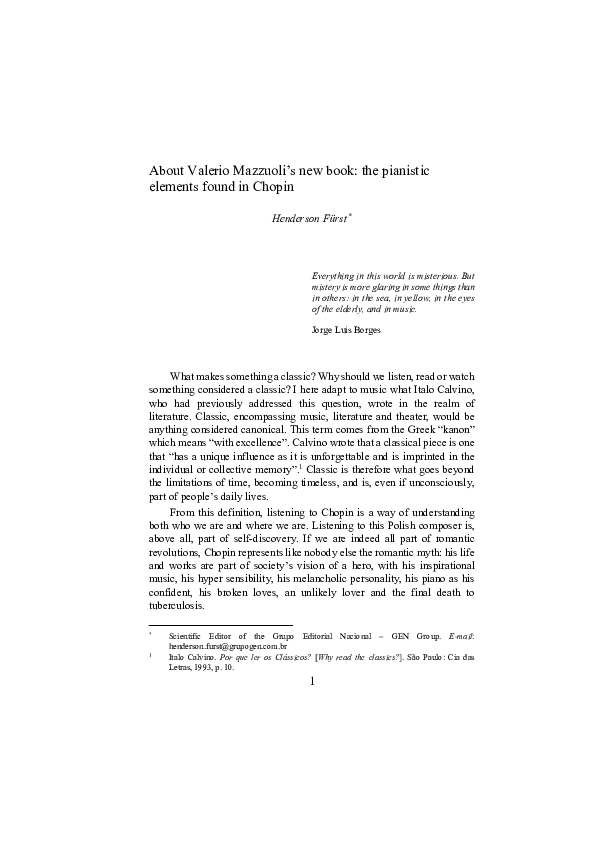Academia.edu no longer supports Internet Explorer.
To browse Academia.edu and the wider internet faster and more securely, please take a few seconds to upgrade your browser.
About Valerio Mazzuoli's new book: the pianistic elements found in Chopin. By Henderson Fürst
About Valerio Mazzuoli's new book: the pianistic elements found in Chopin. By Henderson Fürst
Related Papers
Chopin 1810-2010: Ideas, Interpretations, Influence, Vol. 1, (The Fryderyk Chopin Institute, Warsaw), pp. 449-458
Chopin the Postmodernist2017 •
The Culturology Ideas
Chopin in the writings and music of 20th-century Polish composersMany volumes have already been written about the Polishness of Chopin’s music and about his influence on composers of various nationalities active in the Romantic and later periods. In this text the author looks at how Chopin was viewed by 20th-century Polish composers regarding two aspects: 1) how they interpreted his music in the context of its links to Polishness and 2) whether and how they took on his musical concepts in their own oeuvres. This will allow to shed some light on the reception and resonance (to use the terminology of Mieczysław Tomaszewski, a distinguished expert on Chopin and 20th-century Polish music) of the figure and music of Chopin in Polish music of the previous century. There will be examined an extremely patriotic public speech given by Paderewski in 1910, as well as Szymanowski’s opinions from the 1920s. Moreover, the politically driven celebrations of Chopin Year in 1949 will be recalled. The special attention will be put on the musical genres associated ...
Reception of Chopin and his Music in Polish Society. In spite of the fact that Chopin is regarded as the greatest Polish composer neither his life, nor his music is well known by the mass audience in Poland. The paper presents the results of empirical study on the reception of Chopin in Polish society. The collected data allowed for examination of Polish listeners’ attitudes toward Chopin and the criteria used by respondents to evaluate his music. We also try to investigate the way people perceive Chopin. The specificity of Polish culture and mass culture are the background of the explanation why there is little interest on Chopin’s works in Poland
The subject of this abstract is related to the notion of 'popular music', a notion that should be treated with extreme care, particularly when applied to Frederic Chopin, one of the greatest composers of Romanticism. By ‘popular music’, we mean a category of everyday music, set against the more intellectual kind, referred to as ‘classical’. We only need to look back to the culture of the nineteenth century to realize that this ‘popular music’ refers to the ‘music of the low’. It can be studied from a sociological viewpoint, or as sociological aesthetics. However, we cannot ignore the fact that, very quickly, this music spread to the wealthiest strata of the European society of the nineteenth century, while likewise the lowest classes often listen to the intellectual classical music, so pleasant to listen to. Further, we can observe that a sort of ‘sacralisation of kitsch’ occurs at the intersection between the classical and popular music. This process is the topic of this contribution. We will start by investigating the notion of kitsch through the study of Chopin’s popular compositions. However, before considering the popularisation of this music in today’s culture, we will have to focus on the use of the word kitsch in Chopin’s times, through his own musical aesthetics. Finally, the objective here will be to negate the theory that art is simply the intellectual definition of aesthetics. A kitsch can, obviously, only work on the emotivity of the masses, as it represents one of the features of culture-language (the words which the masses identify with). All art is transformed, becoming something outdated or even outmoded. Here, we are truly within a process of mythologization of art, through the study of the aesthetic reception of the musical work.
RELATED PAPERS
1995 •
DEFENSE RESOURCES MANAGEMENT IN THE 21ST CENTURY
THE DEFENCE RESOURCES MANAGEMENT SYSTEM IN THE GEORGIAN MINISTRY OF DEFENCE2014 •
2023 •
2018 •
2018 •
Frontiers in Oncology
27-hydroxycholesterol and DNA damage repair: implication in prostate cancer2023 •
2024 •
Journal for social action in counseling and psychology
Putting my life into a story2024 •
SCIENCE International Journal
Management of Countryside Walking Tourism Through Understanding Users and Their Needs2023 •
2020 •
Medical Science Educator
ABCDE: Directing Student Observation During High-Fidelity Simulation2020 •
RELATED TOPICS
- Find new research papers in:
- Physics
- Chemistry
- Biology
- Health Sciences
- Ecology
- Earth Sciences
- Cognitive Science
- Mathematics
- Computer Science

 Valerio Mazzuoli
Valerio Mazzuoli Henderson Fürst
Henderson Fürst